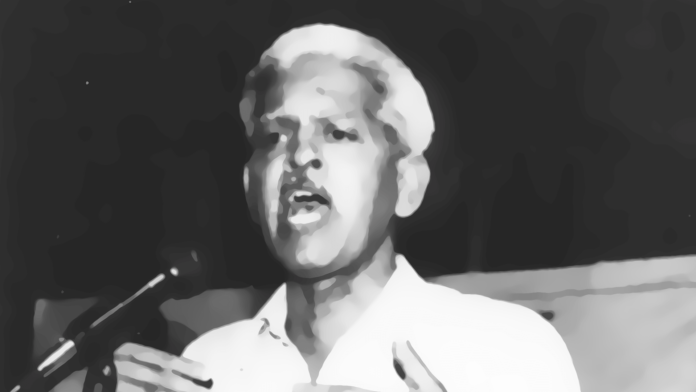A man of many shades, Varavara Rao has been through it all. Call him a poet, teacher, activist, or writer, and you will not be wrong in describing him as such. He has seen the insides of a prison cell several times, ever since he indulged in political writing, starting from the 1960s. Hailing from Telangana, and a staunch advocate of its creation as a separate state, he has written or spoken several words and speeches that the past and present governments felt were incendiary. He has also survived many attempts on his life. Although he has been acquitted in several cases, his recent arrest in August 2018 under the Unlawful Activities (Prevention) Act has been a subject of controversy. He is currently admitted in the Nanavati Hospital, Mumbai due to health issues, and is simultaneously fighting in the courts for getting bail.
Context
Varavara Rao has been known to be associated with Dalit politics. He is also considered to have a revolutionary streak, having been instrumental in starting two writer’s associations in the early 70’s period – the Tirugubatu Kavulu (Association of Rebel Poets) in Warangal, and the Viplava Rachayitala Sangham (Revolutionary Writers’ Association), popularly known as Virasam. He is also known to be a sympathiser of the other revolutionary movements across the country, including those of the Naxalites and Maoists.
His arrest in 2018 happened after his alleged involvement in the violence that took place in Bhima-Koregaon (Maharashtra) on January 1, 2018. Bhima-Koregaon holds an important significance for Dalits and Ambedkarites. It is the place where the Battle of Koregaon took place. On January 1, 1818, a troop of the British Army consisting of a large number of Mahar Dalits defeated the numerically superior force of the Peshwa Baji Rao II. Mahars, a community of people who were oppressed by the upper-caste Peshwa regime, celebrated the victory. A victory pillar was placed on the battlefield by the British. B.R. Ambedkar led the first commemoration ceremony in 1928, after which, Ambedkarites gathered in Bhima-Koregaon and celebrated every year on January 1st.
Elgaar Parishad (a loud assembly) was an event that was held in Pune’s Shaniwarwada Fort on December 31, 2017, to commemorate the 200-year anniversary of the Battle of Koregaon. Several people, numbering 35,000, were part of the celebrations which included cultural activities, speeches and sloganeering by activists and others. After the event, on January 1, 2018, violent clashes erupted in Bhima-Koregaon in which one person died and several people were injured. Many activists and speakers from the Elgaar Parishad were arrested for allegedly inciting violence, including Varavara Rao.
Police’s accusations:
The Maharashtra Police under the then-BJP government claimed that there was sufficient proof to establish links between the arrested activists and Maoists. They alleged that Varavara Rao had links with the Maoists and was involved in arms procurement. A letter seized from the laptop of Rona Wilson, a prison rights activist who was also arrested in this case, allegedly pointed to Varavara Rao’s involvement in anti-national activities.
Param Bir Singh, the then-Additional Director General of Police (Law and Order), held a press conference in which he read the contents of the letter. He quoted from one of the letters, which read, “I [referring to Rona Wilson] have been in touch with designated contact in Nepal (for weapon procurement). Our comrades in Manipur can also assist in this. But only V V (Varavara Rao) is authorised to communicate with them.”
The letter further quoted Rona Wilson, which read, “It would benefit us to fast track the process and get equipments ready on ground. We are losing dozens and dozens of comrades in encounters in different states.”
The New Indian Express noted, “Singh read out letters exchanged between Varavara Rao and Surendra Gadling. One of them was urging the “pressing need to do Sukma-like heavy ambush”, while the other was regarding the 80 vehicles burnt at Surjagarh in Gadchiroli on instructions from Rao. Another letter exchanged between them has Rao writing to Gadling about money not reaching the foot soldiers in Gadchiroli and Gadling and blaming it on demonetization.”
The police also accused the activists of plotting an end to ‘Modi-raj’ through a ‘Rajiv Gandhi-type incident’.
Varavara Rao’s defence:
Varavara Rao has rubbished all the charges against him. In a letter written from the jail, he wrote, “All of us could very well understand why the Elgar Parishad meeting on December 31, 2017 was branded as ‘Maoist provoked’ and funded, and said to have caused the Bhima Koregaon violence on January 1, 2018. (Amitav Ghosh, the renowned writer, in his letter to me in prison wrote that he lived in Calcutta as a young student during the thick of the Naxalite movement and he differs with them. But, he observes, the Bhima Koregaon violence does not look like ‘Naxalite violence, all said and done’). The fact is, everybody, including the state, knows that it was a violent Brahmanical Hindutva conspiracy against the broad unity of Dalits, Adivasis, Muslims, OBCs and even a section of Marathas, beside democrats.”
The Elgaar Parishad was organised by two retired judges of the Supreme Court and Bombay High Court – Justice P.B. Sawant and Justice B.G. Kolse Patil, respectively. If the event led to the violent aftermath, the event organisers should have been investigated by the police. However, it was not done.
The defence counsel for the activist, advocate Rohan Nahar, noted that there was no evidence to link Varavara Rao and the Maoists. The Hindu reported the advocate as saying that the “content of the letters was so flimsy that they were utterly insufficient to tie the 78-year-old Mr. Rao to a wider conspiracy allegedly unearthed by the Pune city police probing the Bhima-Koregaon clashes of January 1, 2018.”
Recommended Reading:
Journalist and Varavara Rao’s nephew, N. Venugopal Rao has written an 8-part series titled ‘The Making of Varavara Rao’. All the articles can be accessed here.


